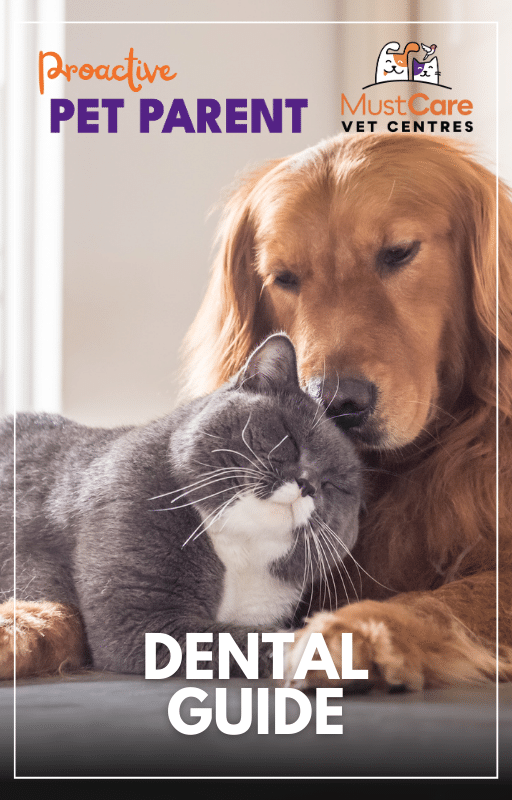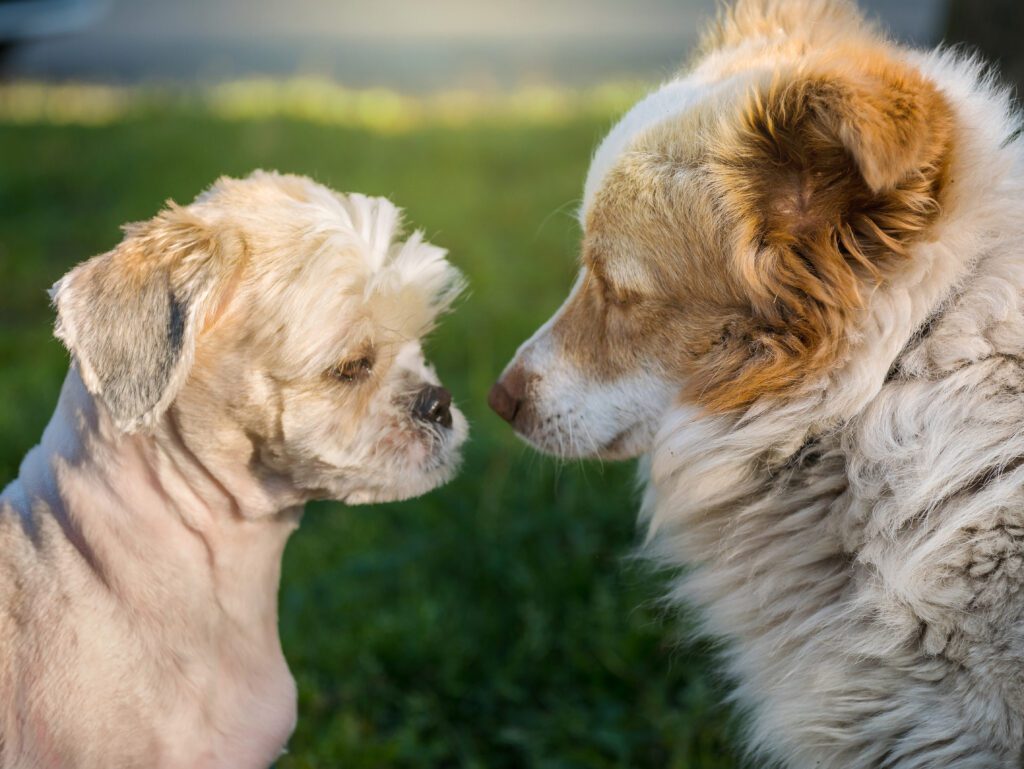Share This Blog With Other Pet Parents!
Pet Socialisation Over Christmas: Introducing Them to Guests & Holiday Training Tips
The festive season is upon us! Marked by families gathering together and bustling households, often brings with it the challenge of socialising pets with new faces and unfamiliar experiences. Many pet owners grapple with the uncertainty of how their pets will react to an influx of holiday guests. Will the atmosphere be one of ease or one tinged with stress?
It’s crucial to ensure that pets are not only part of the festivities but also comfortable and confident amidst them. This guide will explore techniques for effective pet socialisation over Christmas, from introducing them to holiday guests to adopting the best holiday pet training strategies.
What you’ll learn from this blog:

For all you need to know, download our
FREE Dental Guide
This blog is part of our Proactive Pet Parent series! This is just the beginning… To see more blogs, click here! Better yet, sign-up to our newsletter to receive these directly to your inbox each month.
Sign-up To The Proactive Pet Parent Newsletter
Understanding Pet Behaviour
Each pet, whether it’s a playful dog, a reserved cat, or an observant bird, has its unique behaviour traits and comfort zones. During festive times, these characteristics can become more pronounced as they encounter a multitude of stimuli. During these times of additional stress and stimulation, animals have heightened senses. This explains why the soft melodies we enjoy (who doesn’t love a good Micahel Bublé Christmas song!) could sound much louder to them, not to mention the extra foot traffic bustling through the house.
Changes in environment, like moving furniture to accommodate decorations or guests, can also unsettle pets. They are creatures of routine and habit, and even small alterations can lead them to feel out of place. The influx of new people, particularly those unfamiliar with handling animals, can be a source of anxiety. A dog might become overexcited and jump on guests, while a cat might prefer hiding away. Birds and other exotic pets might react by becoming more vocal or retreating to a familiar corner.
It’s crucial to watch out for signs of stress or discomfort in pets. These can range from subtle cues like excessive grooming, avoiding food, or changes in vocalisation to more evident signs like aggressive behavior or attempts to escape. By understanding these signs, proactive measures can be taken to mitigate potential issues.
Having this foundational knowledge about pet behavior provides a significant advantage. Not only does it guide in preparing the home environment for the festivities, but it also empowers pet owners to educate their guests on interaction guidelines. The more one knows about their pet’s behavior, the easier it becomes to ensure their well-being and that of the guests during holiday gatherings.
Preparing Your Pet Before the Festivities
By taking certain measures before the festivities begin, pet owners can greatly reduce the chances of their animals feeling overwhelmed or stressed.
- Start with a routine check-up. Ensure that the pet is in good health and up-to-date with all vaccinations. A healthy pet is generally more resilient to stressors. Additionally, if a pet requires any medications or special care, being proactive will prevent last-minute rushes during the busy season.
- Establishing a safe space for the pet is vital. Designate an area in the house, away from the main event, where the animal can retreat to if things get too hectic. This could be a specific room, a crate, or a quiet corner stocked with their favorite toys and bedding. If guests are staying overnight, familiarise them with this space, so they understand it’s the pet’s sanctuary and shouldn’t be disturbed.
- Engage pets in a bit more physical activity leading up to the big day. For dogs, consider longer walks or extra playtime. For cats, interactive toys or laser pointers can be great ways to keep them active. Expending energy helps in reducing anxiety and ensures they are more relaxed during the actual festivities.
- Lastly, consider introducing calming solutions if a pet is known to get particularly anxious. There are numerous over-the-counter sprays, diffusers, and collars designed to reduce stress in pets. However, it’s always wise to consult a vet before introducing any new products.
Introducing Pets to Holiday Guests
The doorbell rings, and there’s a flurry of excitement – holiday guests have arrived! While it’s a moment of joy for many, for our pets, it can be a mix of curiosity, anxiety, and anticipation. Making these introductions smoothly is essential for both our furry friends and our visitors.
- One effective approach is a controlled introduction. Before guests arrive, place pets in a separate room. Once guests have settled in, let the pet out and calmly introduce them. This reduces the sudden onslaught of new scents and voices and allows pets to process the situation more gradually.
- Brief guests about the pet’s personality. Some pets are outgoing and love the attention, while others might be shy or even protective. Informing guests about the pet’s behavior helps them interact more appropriately, reducing potential stress. It’s equally vital to guide children on how to approach pets, emphasising gentle touches and understanding the animal’s personal space.
- Having a few treats on hand can also ease the process. Encouraging guests to give pets a treat (after checking dietary restrictions) can create a positive association with new faces. This little gesture can help in winning the pet’s trust more quickly.
- A crucial tip to remember is to watch for signs of stress in pets: excessive panting, hiding, or aggressive behavior. If these signs appear, it might be best to give pets a break and let them retreat to their designated safe space.
Finally, throughout the gathering, make sure to spend some moments with the pet. Amid the festivities and interactions, pets can feel left out. A quick cuddle or a few words of affirmation can reassure them that they remain a central part of the family and celebrations.
Holiday Pet Training Techniques
The holiday season, with its blend of new experiences and vibrant festivities, presents an opportune moment to reinforce or introduce certain training techniques for pets. Preparing pets for such occasions requires a mix of patience, consistency, and understanding their unique personalities.
- Start with the basics. Sit, stay, and come commands are foundational for managing pets amidst the holiday bustle. Regularly practicing these commands a few weeks before the holidays ensures that pets respond promptly when it matters most. Reinforce their good behaviour with positive reinforcement like treats or praise.
- Distraction techniques are pivotal, especially when the household is busy with preparations or when guests are around. Toys, puzzle feeders, or even command-based games can keep pets engaged and less likely to react to potential stressors.
- Then there’s the “leave it” command. With festive treats often within reach, teaching pets to resist the temptation of grabbing something off the table or floor is vital. Consistent training combined with immediate rewards when pets exhibit self-control can make a significant difference.
- Noise desensitisation can be especially helpful if the household anticipates loud noises from celebrations or fireworks. Playing recordings of these noises at low volumes and gradually increasing them over days can help pets become accustomed to these sounds, reducing their anxiety when they occur in real time.
- Establishing a designated safe space is also a technique of its own. Whether it’s a quiet room or a cozy corner with their favourite blanket, ensuring pets have an area they can retreat to when overwhelmed can make them feel secure.
It’s essential to remember that every pet is an individual. While these techniques are general guidelines, observing and understanding each pet’s reactions and adapting accordingly will make for a more harmonious holiday experience for all.
Engaging Activities for Socialisation
Holidays can be a blend of excitement and novelty, but they also offer a golden opportunity to enhance a pet’s social skills. By planning engaging activities tailored for socialisation, owners can ensure their pets have positive encounters, helping them build confidence and adaptability.
- Organised Playdates: Scheduling playdates with known pets in a controlled environment can ease pets into new social situations. Familiar settings combined with one or two new furry friends can make the experience less intimidating.
- Interactive Toys and Puzzles: These not only keep pets mentally stimulated but can also become a shared activity with guests. Encouraging visitors to engage in play can help pets associate new faces with fun times.
- Structured Group Walks: Whether in a park or a neighborhood, group walks can introduce pets to various environments and fellow animals. They can learn to navigate through different situations while having their trusted human by their side.
- Set up Observation Points: Create spaces where pets can observe the holiday hustle and bustle from a distance, like a secured balcony or a window perch. Over time, their curiosity might lead them to explore and mingle.
- Practice Passive Interactions: Not all socialisation needs to be active. Sometimes, having a pet in the same room with guests, but not forcing interactions, allows them to get accustomed to new sounds, smells, and sights at their own pace.
- Include Them in Activities: Simple acts like decorating, cooking, or wrapping gifts can involve pets. While they might not understand the holiday significance, the inclusion fosters a sense of belonging.
By incorporating these activities, owners can nurture their pet’s social skills during the holidays to create a balance where pets feel secure, engaged, and part of the festivities.

Addressing Unforeseen Challenges
During the bustling holiday season, even with meticulous preparation, unexpected situations can arise with pets. Understanding and promptly addressing these scenarios ensures both pets and guests remain at ease.
- Overstimulation: A sudden influx of guests or changes in environment can sometimes overwhelm pets. If signs of anxiety or stress, like excessive pacing or hiding, are observed, it might be beneficial to give pets a quiet space or a temporary break away from the activity.
- Food and Decorations: Curious pets might get tempted by holiday treats or shiny decorations. Ensure that all foods and ornaments, especially those toxic to pets, are out of reach. It’s also helpful to inform guests about feeding protocols.
- Allergies or Phobias: Some visitors might have allergies or an innate fear of certain animals. It’s prudent to communicate in advance about the pets in the household and make arrangements, such as allocating allergen-free zones or setting up barriers, to accommodate everyone’s needs.
- Unexpected Reactions: Even the most social pets can occasionally react unpredictably. It’s essential to monitor their interactions, especially with children or unfamiliar guests. Should a pet become too agitated or fearful, it’s best to remove them from the situation and allow them time to calm down.
- Changes in Routine: Pets thrive on routine. While holidays often mean deviations from the norm, try to keep their feeding, walking, and sleeping schedules as consistent as possible. This consistency can act as an anchor amidst the holiday chaos.
By being proactive and having a contingency plan, potential challenges can be addressed seamlessly. It fosters an environment where both pets and people can enjoy the holiday spirit harmoniously. As always, the pet’s welfare should remain a top priority, ensuring they too can partake in the joyous season without undue stress.
Prioritising pet welfare is paramount. By understanding their behavioural cues, setting them up for success with preliminary training, and having a plan for unexpected challenges, pet owners can confidently embrace the festivities. It’s essential to remember that, like humans, every pet is an individual. What works for one might not work for another, and flexibility is key.

